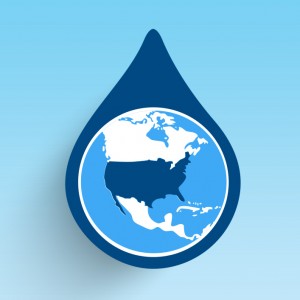The decline in global water purity is worsening, with the United Nations flagging the issue as a major health concern. Among the organization’s statistics is the amount of industrial and agricultural waste that is discharged into the world’s water – two million tons of sewage. That is the equivalent of the weight of the entire human population of 6.8 billion people.
Here in the United States, we enjoy some of the safest water in the world. But 85 percent of households in America are suffering from a significant water problem, and many homeowners don’t even know it.
The United States’ Water Issue
The issue is hard water. Hard water contains high concentrations of calcium and magnesium. As water trickles through rocks, limestone deposits and soil, it picks up these minerals. Your home’s water tap may pick up a lot of those same minerals, depending on how long the water travels through the ground before reaching your home. Homeowners in six metro areas experience the hardest water conditions: Indianapolis, Las Vegas, Minneapolis, Phoenix, San Antonio, and Tampa.
But even if you don’t live in those areas, you may experience some form of hard water. Each city has a “number.” That number is grains per gallon (gpg) and will determine if you live in a slightly hard, moderately hard, hard, very hard or extremely hard water area. A grain is defined as 17.1 milligrams of calcium carbonate dissolved in one liter of water. Hard water is about 7 gpg or higher. So, for example, if you have moderately hard water your gpg is 3-7 but extremely hard water would be 15+ gpg. Check out your area’s gpg category here.
Hard Water Signs
If your home is in a hard water area, how can you be sure it is affecting your family? Here are some signs: dull hair dull and dry skin; spotty drinking glasses; itchy, faded and dingy clothing. You may have noticed higher energy bills. That’s because your water heater uses up to 29 percent more energy with hard water. Your plumbing and appliances may be suffering too. Scale buildup can lead to clogged pipes and lower water pressure. That same scale buildup also decreases the efficiency of water-using appliances and reduces their lifespan by up to 50 percent.
How Hard Is Your Water
This may be the first time you’ve ever heard that your home may have hard water. A permanent solution for hard water is a water softener. To begin fixing your hard water problem, request a free water test that will determine your gpg. From there, we can help you identify the right system for your home with a water softener from EcoWater.

